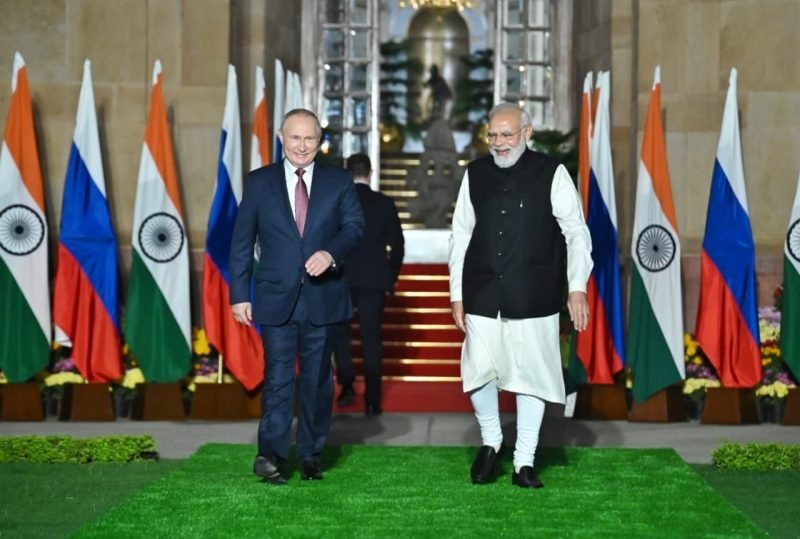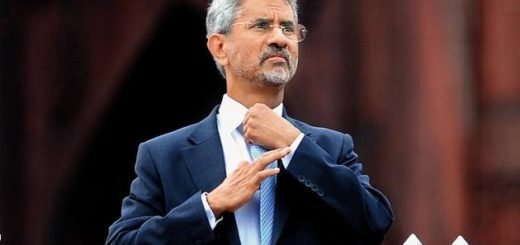Takeaways from President Putin’s visit to India

Speculations that India-Russia relations are going down due to the changing geopolitical environment have been proved wrong by the top leaders of both countries. First, the Defense and Foreign Ministers of both the countries met separately in New Delhi, after that the first joint meeting of these four was held under the two plus two arrangement. Prime Minister Narendra and President Vladimir Putin, who arrived in India on a few hours’ visit, led the India-Russia summit. During these day-long meetings, the relations between the two countries showed the warmth of the old days and the issues ranging from bilateral defence ties, challenges in Afghanistan, terrorism, Indo-Pacific and pandemic to new cooperation in the field of space and science were discussed.
Amid India’s growing strategic partnership with the US and Russia’s ever-strengthening rapprochement with China. Modi and Putin have given a strong political signal at the global level through this summit. It is indicated that the relations between India and Russia will also be made relevant according to the changing global environment. At the same time, both countries will play an important role in the efforts to rebalance the global order. This is the reason that despite the increasing cases of COVID-19 in Russia and the diplomatic challenges arising from Ukraine on the eastern front, President Putin visited India, even if only for a few hours. His convoy reached Hyderabad House directly from the airport where he was received by Prime Minister Modi. There was great warmth in the meeting of both reflecting the warmth of relations on the individual level in both countries.
Putin is the architect of progress in relations: PM Modi
Delivering the opening speech at the summit, Prime Minister Modi described Putin’s visit as a symbol of his commitment to India-Russia relations. Modi said that you are the main driver of the progress that has been made in our special strategic relationship in the last 20 years. The two countries have not only cooperated with each other but have also taken care of each other’s sensitivities. This is a very different reliable model.
India is a big power – President Putin
In his address, President Putin expressed his happiness on visiting New Delhi. He said that Russia will continue to cooperate with India on the global stage and agenda. The two countries have similar ideologies on most international issues. Terrorism and the narcotics trade are a cause of concern for both. President Putin also shared similar concerns regarding Afghanistan and said “we consider India a great power and a reliable friend”. Both the leaders mentioned the current geopolitical challenges faced by their respective countries in recent times, although no country was named in it.
S400 and Sputnik
Russian Foreign Minister Sergey Lavrov on Monday said that the S-400 deal with India has been implemented. Speaking to news agency ANI, Lavrov, who is in India for the India-Russia summit and inaugural 2+2 dialogue, said that the deal has a ‘very practical meaning for India’s defence capability’.
“S-400 deal doesn’t have only a symbolic meaning. It has a very important practical meaning for an Indian defence capability and the situation is basically underway. The deal has been implemented,” he said.
Coinciding with the Russian President’s visit, the Russian Direct Investment Fund (RDIF) said on Monday that it is “ready” to provide India with the one-shot Sputnik Light vaccine and Sputnik M vaccine for adolescents. As Russia moves to develop strategic cooperation with India, RDIF CEO Kirill Dmitriev said in a statement that Russia and India have joined forces since the start of the COVID-19 pandemic and noted that the strategic partnership included the production of Sputnik V and Sputnik Light vaccines.
Addressing the sensitive topics
Ahead of the Modi-Putin summit, Defense Minister Rajnath Singh and External Affairs Minister S. Jaishankar had their first talks under the two-plus-two arrangement with Russian Defense Minister General Sergei Shoigu and Foreign Minister Sergei Lavrov. The India-Russia Intergovernmental Commission on Military-Technical Cooperation, led by the Defense Ministers of both the countries, also met. Issues that were pricking each other were also raised in the bilateral meetings. For example, the issue of the alliance formed between India, America, Japan and Australia in the Indo-Pacific and the United States and Britain’s plan to give nuclear submarines to Australia was raised. The way India and Russia show similar thinking on the issue of Afghanistan, its effect can be seen in the coming times.


















